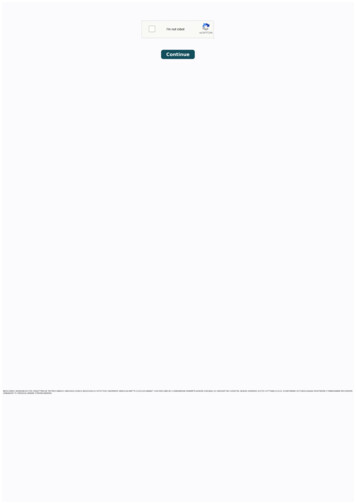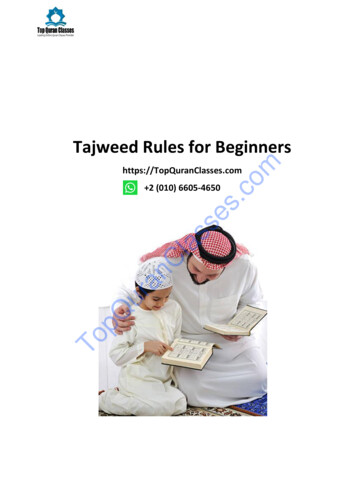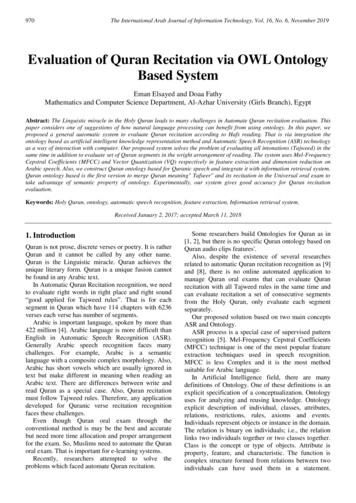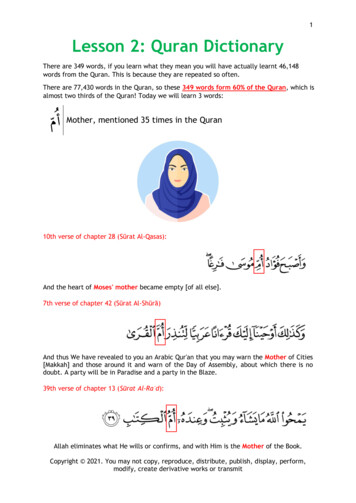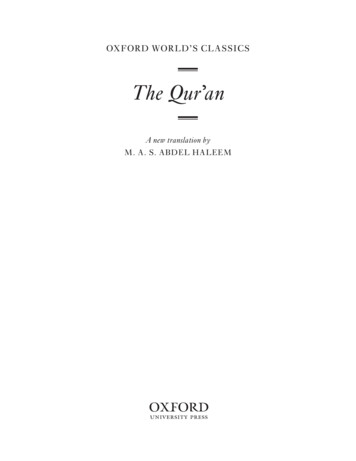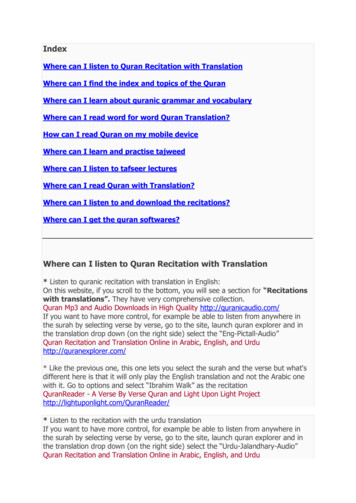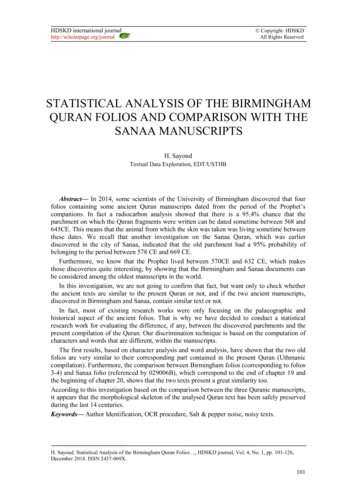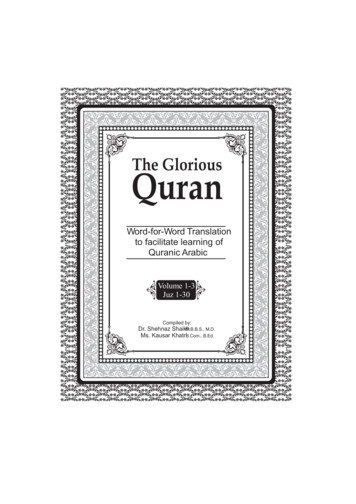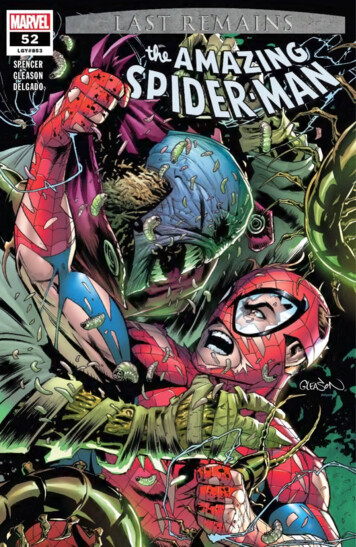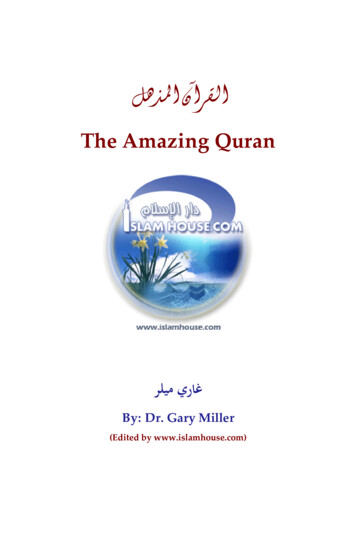
Transcription
ﺍﻟﻘﺮﺁﻥ ﺍﳌﺬﻫﻞ The Amazing Quran ﻏﺎري ﻣﻴﻠﺮ By: Dr. Gary Miller(Edited by www.islamhouse.com)
www.islamhouse.comCopyright All Rights Reserved 1992. Abul-Qasim Publishing House (AQPH).This material has been reviewed and forwarded for publishing and distribution by theEnglish language section of the Department of Islamic Resources.Form #: 124Date: 23/11/1426If you have any corrections, comments, or questions about this publication, please feelfree to contact us at:en@islamhouse.comwww.islamhouse.com2
www.islamhouse.comIntroductionOne thing which surprises non-Muslims who areexamining the book very closely is that the Quran does notappear to them to be what they expected. What theyassume is that they have an old book which came fourteencenturies ago from the Arabian desert; and they expectthat the book should look something like that - an oldbook from the desert. And then they find out that it doesnot resemble what they expected at all. Additionally, oneof the first things that some people assume is that becauseit is an old book which comes from the desert, it shouldtalk about the desert. Well the Quran does talk about thedesert - some of its imagery describes the desert; but it alsotalks about the sea - what it’s like to be in a storm on thesea.3
www.islamhouse.comMerchant MarineSome years ago, the story came to us in Toronto about aman who was in the merchant marine and made hisliving on the sea. A Muslim gave him a translation of theQuran to read. The merchant marine knew nothing aboutthe history of Islam but was interested in reading theQuran. When he finished reading it, he brought it back tothe Muslim and asked, “This Muhammad, was he asailor?” He was impressed at how accurately the Qurandescribes a storm on a sea. When he was told, “No as amatter of fact, Muhammad lived in the desert,” that wasenough for him. He embraced Islam on the spot.He was so impressed with the Quran’s description becausehe had been in a storm on the sea, and he knew thatwhoever had written that description had also been in astorm on the sea. The description of“ a wave, over it a wave, over it clouds” (Surah Nur,24:40) was not what someone imagining a storm on a sea to belike would have written; rather, it was written by someonewho knew what a storm on the sea was like. This is oneexample of how the Quran is not tied to certain place andtime. Certainly, the scientific ideas expressed in it also donot seem to originate from the desert fourteen centuriesago.4
www.islamhouse.comThe Smallest ThingMany centuries before the onset of Muhammad’sprophethood, there was a well-known theory of atomismadvanced by the Greek philosopher, Democritus. He andthe people who came after him assumed that matterconsists of tiny, indestructible, indivisible particles calledatoms. The Arabs too, used to deal in the same concept; infact, the Arabic word dharrah commonly referred to thesmallest particle known to man. Now, modern science hasdiscovered that this smallest unit of matter (i.e., the atom,which has all of the same properties as its element) can besplit into its component parts. This is a new idea, adevelopment of the last century; yet; interestingly enough,this information had already been documented in theQuran (Surah Saba’, 34:3) which states:“He [i.e., Allah] is aware of an atom’s weight in theheavens and on the earth and even anything smallerthan that.”Undoubtedly, fourteen centuries ago that statement wouldhave looked unusual, even to an Arab. For him, thedharrah was the smallest thing there was. Indeed, this isproof, that the Quran is not outdated.5
www.islamhouse.comHoneyAnother example of what one might expect to find in an“old book” that touches upon the subject of health ormedicine is outdated remedies or cures. Various historicalsources state that the Prophet ( ) gave some advice abouthealth and hygiene, yet most of these pieces of advice arenot contained in the Quran. At first glance, to the nonMuslims this appears to be a negligent omission. Theycannot understand why Allah would not “include” suchhelpful information in the Quran. Some Muslims attemptto explain this absence with the following argument:“Although the Prophet’s advice was sound and applicableto the time in which he lived, Allah, in His infinitewisdom, knew that there would come later medical andscientific advances which would make the Prophet’sadvice appear outdated. When later discoveries occurred,people might say that such information contradicted thatwhich the Prophet ( ) had given. Thus, since Allah wouldnever allow any opportunity for the non-Muslims to claimthat the Quran contradicts itself or the teachings of theProphet ( ), He only included in the Quran informationand examples which could stand the test of time.”However, when one examines the true realities of theQuran in terms of its existence as a divine revelation, theentire matter is quickly brought into its properperspective, and the error in such argumentation becomes6
www.islamhouse.comclear and understandable.It must be understood that the Quran is a divinerevelation, and as such, all information in it is of divineorigin. Allah revealed the Quran from Himself. It is thewords of Allah, which existed before creation, and thusnothing can be added, subtracted or altered. In essence,the Quran existed and was complete before the creation ofProphet Muhammad ( ), so it could not possibly containany of the Prophet’s own words or advice. An inclusion ofsuch information would clearly contradict the purpose forwhich the Quran exists, compromise its authority andrender it inauthentic as a divine revelation.Consequently, there was no “home remedies” in theQuran which one could claim to be outdated; nor does itcontain any man’s view about what is beneficial to health,what food is best to eat, or what will cure this or thatdisease. In fact, the Quran only mentions one item dealingwith medical treatment, and it is not in dispute by anyone.It states that in honey there is healing. And certainly, I donot think that there is anyone who will argue with that!7
www.islamhouse.comProphet Muhammad ( ) and the QuranIf one assumes that the Quran is the product of a man’smind, then one would expect it to reflect some of what wasgoing on in the mind of the man who “composed” it. Infact, certain encyclopedias and various books claim thatthe Quran was the product of hallucinations thatMuhammad underwent. If these claims are true - if itindeed originated from some psychological problems inMuhammad’s mind - then evidence of this would beapparent in the Quran. Is there such evidence? In order todetermine whether or not there is, one must first identifywhat things would have been going on in his mind at thattime and then search for these thoughts and reflections inthe Quran.It is common knowledge that Muhammad ( ) had a verydifficult life. All of his daughters died before him exceptone, and he had a wife of several years who was very dearand important to him, who not only proceeded him indeath but died at a very critical period of his life. As amatter of fact, she must have been quite a woman becausewhen the first revelation came to him, he ran home to her,afraid. Certainly, even today one would have a hard timetrying to find an Arab who would tell you, “I was soafraid that I ran home to my wife.” They just aren’t thatway. Yet Muhammad ( ) felt comfortable enough with his8
www.islamhouse.comwife to be able to do that. That’s how influential andstrong woman she was. Although these examples are onlya few of the subjects that would have been onMuhammad’s mind, they are sufficient in intensity toprove my point.The Quran does not mention any of these things - not thedeath of his children, not the death of his belovedcompanion and wife, not his fear of the initial revelations,which he so beautifully shared with his wife - nothing; yetthese topics must have hurt him, bothered him, andcaused him pain and grief during periods of his life.Indeed, if the Quran was a product of his psychologicalreflections, then these subjects, as well as others, would beprevalent or at least mentioned throughout.9
www.islamhouse.comScientific Approach to the QuranA truly scientific approach to the Quran is possiblebecause the Quran offers something that is not offered byother religious scriptures, in particular, and otherreligions, in general. It is what scientists demand. Todaythere are many people who have ideas and theories abouthow the universe works. These people are all over theplace, but the scientific community does not even bother tolisten to them. This is because within the last century thescientific community has demanded a test of falsification.They say, “If you have theory, do not bother us with itunless you bring with that theory a way for us to provewhether you are wrong or not.”Such a test was exactly why the scientific communitylistened to Einstein towards the beginning of the century.He came with a new theory and said, “I believe theuniverse works like this; and here are three ways to provewhether I am wrong!” So the scientific communitysubjected his theory to the tests, and within six years itpassed all three. Of course, this does not prove that he wasgreat, but it proves that he deserved to be listened tobecause he said, “This is my idea; and if you want to try toprove me wrong, do this or try that.”This is exactly what the Quran has - falsification tests. Someare old (in that they have already been proven true), and10
www.islamhouse.comsome still exist today. Basically it states, “If this book is notwhat it claims to be, then all you have to do is this or this orthis to prove that it is false.” Of course, in 1400 years noone has been able to do “This or this or this,” and thus it isstill considered true and authentic.Falsification TestI suggest to you that the next time you get into disputewith someone about Islam and he claims that he has thetruth and that you are in darkness, you leave all otherarguments at first and make this suggestion. Ask him, “Isthere any falsification test in your religion? Is thereanything in your religion that would prove you are wrongif I could prove to you that it exists - anything?” Well, I canpromise right now that people will not have anything - notest, no proof, nothing! This is because they do not carryaround the idea that they should not only present whatthey believe but should also offer others a chance to provethey’re wrong. However, Islam does that.A perfect example of how Islam provides man with achance to verify it authenticity and “prove it wrong”occurs in the 4th chapter. And quiet honestly, I was verysurprised when I first discovered this challenge. It states(Surah An-Nisa, 4:82):11
www.islamhouse.com“Do they not consider the Quran? Had it been fromany other than Allah, they would surely have foundtherein much discrepancy.”This is a clear challenge to the non-Muslim. Basically, itinvites him to find a mistake. As a matter of fact, theseriousness and difficulty of the challenge aside, the actualpresentation of such a challenge in the first place is noteven in human nature and is inconsistent with man’spersonality. One doesn’t take an exam in school and afterfinishing the exam, write a note to the instructor at the endsaying, “This exam is perfect. There are no mistakes in it.Find one if you can!” One just doesn’t do that. The teacherwould not sleep until he found a mistake! And yet this isthe way the Quran approaches people.12
www.islamhouse.comAsk Those Who Have KnowledgeAnother interesting attitude that exists in the Quranrepeatedly deals with its advice to the reader. The Quraninforms the reader about different facts and then gives theadvice: “If you want to know more about this or that, or ifyou doubt what is said, then you should ask those whohave knowledge.” This too is a surprising attitude. It is notusual to have a book that comes from someone withouttraining in geography, botany, biology, etc., who discussesthese subjects and then advises the reader to ask men ofknowledge if he doubts anything. Yet in every age therehave been Muslims who have followed the advice of theQuran and made surprising discoveries. If one looks to theworks of Muslim scientists of many centuries ago, onewill find them full of quotations from the Quran. Theseworks state that they did research in such a place, lookingfor something. And they affirm that the reason theylooked in such and such a place was that the Quranpointed them in that direction.For example, the Quran mentions man’s origin and thentells the reader, “Research it!” It gives the reader a hintwhere to look and then states that one should find outmore about it. This is the kind of thing that Muslims todaylargely seem to overlook - but not always, as illustrated inthe following example.13
www.islamhouse.comEmbryologyA few years ago, a group of men in Riyadh, Saudi Arabiacollected all of the verses in the Quran which discussembryology - the growth of the human being in the womb.They said, “Here is what the Quran says. Is it the truth?”In essence, they took the advice of the Quran: “Ask themen who know.” They chose, as it happened, a nonMuslim who is a professor of embryology at theUniversity of Toronto. His name is Keith Moore, and he isthe author of textbooks on embryology - a world expert onthe subject. They invited him to Riyadh and said, “This iswhat the Quran says about your subject. Is it true? Whatcan you tell us?”While he was in Riyadh, they gave him all the help that heneeded in translation and all of the cooperation for whichhe asked. And he was so surprised at what he found thathe changed his textbooks. In fact, in the second edition ofone of his books, called Before We Are Born. in the sectionabout the history of embryology, he included somematerial that was not in the first edition because of what hefound in the Quran was ahead of its time and that thosewho believe in the Quran know what other people do notknow.I had the pleasure of interviewing Dr. Keith Moore for atelevision presentation, and we talked a great deal about14
www.islamhouse.comthis - it was illustrated by slides and so on. He mentionedthat some of the things that the Quran states about thegrowth of the human being were not known until thirtyyears ago. In fact, he said that one item in particular - theQuran’s description of the human being as a “leech-likeclot” (‘alaqah) [Ghafir 40:67] - was new to him; but whenhe checked on it, he found that it was true, and so headded it to his book. He said, “I never thought of thatbefore,” and he went to the zoology department and askedfor a picture of a leech. When he found that it looked justlike the human embryo, he decided to include bothpictures in one of his textbooks.Although the aforementioned example of man researchinginformation contained in the Quran deals with a nonMuslim, it is still valid because he is one of those who isknowledgeable in the subject being researched. Had somelayman claimed that what the Quran says aboutembryology is true, then one would not necessarily haveto accept his word. However, because of the high position,respect, and esteem man gives scholars, one naturallyassumes that if they research a subject and arrive at aconclusion based on that research, then the conclusion isvalid.15
www.islamhouse.comSkeptic’s ReactionDr. Moore also wrote a book on clinical embryology, andwhen he presented this information in Toronto, it causedquite a stir throughout Canada. It was on the front pagesof some of the newspapers across Canada, and some of theheadlines were quite funny. For instance, one headlineread: “SURPRISING THING FOUND IN ANCIENTPRAYER BOOK!” It seems obvious from this example thatpeople do not clearly understand what it is all about. As amatter of fact, one newspaper reporter asked ProfessorMoore, “Don’t you think that maybe the Arabs mighthave known about these things - the description of theembryo, its appearance and how it changes and grows?Maybe they were not scientists, maybe they did somecrude dissections on their own - carved up people andexamined these things.” The professor immediatelypointed out to him that he [i.e., the reporter] had missed avery important point - all of the slides of the embryo thathad been shown and that had been projected in the filmhad come from pictures taken through a microscope. Hesaid, “It does not matter if someone had tried to discoverembryology fourteen centuries ago. They could not haveseen it!”All of the descriptions in the Quran of the appearance ofthe embryo are of the item when it is still too small to see16
www.islamhouse.comwith the eye; therefore, one needs a microscope to see it.Since such a device had only been around for little morethan two hundred years, Dr. Moore taunted, “Maybefourteen centuries ago someone secretly had a microscopeand did this research, making no mistakes anywhere.Then he somehow taught Muhammad ( ) and convincedhim to put this information in his book. Then he destroyedhis equipment and kept it a secret forever. Do you believethat? You really should not unless you bring some proofbecause it is such a ridiculous theory.” In fact, when hewas asked, “How do you explain this information in theQuran?” Dr. Moore’s reply was, “It could only have beendivinely revealed!”17
www.islamhouse.comGeologyOne of Professor Moore’s colleagues, Marshall Johnson,deals extensively with geology at the University of Toronto.He became very interested in the fact that the Quran’sstatements about embryology are accurate, and so heasked Muslims to collect everything contained in theQuran which deals with his specialty. Again people werevery surprised at the findings. Since there are a vastnumber subjects discussed in the Quran, it would certainlyrequire a large amount of time to exhaust each subject. Itsuffices for the purpose of this discussion to state that theQuran makes very clear and concise statements aboutvarious subjects while simultaneously advising the readerto verify the authenticity of these statements with researchby scholars in those subjects. And as illustrated by theprevious examples of embryology and geology, the Quranhas clearly emerged authentic.18
www.islamhouse.comYou Did Not Know This Before!Undoubtedly, there is an attitude in the Quran which isnot found anywhere else. It is interesting how when theQuran provides information, it often tells the reader, “Youdid not know this before.” Indeed, there is no scripturethat exists which makes that claim. All of the other ancientwritings and scriptures that people have do give a lot ofinformation, but they always state where the informationcame from.For example, when the Bible discusses ancient history, itstates that this king lived here, this one fought in a certainbattle, another one had so may sons, etc. Yet it alwaysstipulates that if you want more information, then youshould read the book of so and so because that is wherethe information came from. In contrast to this concept, theQuran provides the reader with information and statesthat this information is something new. Of course, therealways exists the advice to research the informationprovided and verify its authenticity. It is interesting thatsuch a concept was never challenged by non-Muslimsfourteen centuries ago. Indeed, the Makkans who hatedthe Muslims, and time and time again they heard suchrevelations claiming to bring new information; yet, theynever spoke up and said, “This is not new. We knowwhere Muhammad got this information. We learned this19
www.islamhouse.comat school.” They could never challenge its authenticitybecause it really was new!20
www.islamhouse.comProof of Authenticity: An ApproachIt must be stressed here that the Quran is accurate aboutmany, many things, but accuracy does not necessarilymean that a book is a divine revelation. In fact, accuracy isonly one of the criteria for divine revelations. For instance,the telephone book is accurate, but that does not mean thatit is divinely revealed. The real problem lies in that onemust establish some proof of the source the Quran’sinformation. The emphasis is in the other direction, in thatthe burden of proof is on the reader. One cannot simplydeny the Quran’s authenticity without sufficient proof. If,indeed, one finds a mistake, then he has the right todisqualify it. This is exactly what the Quran encourages.Once a man came up to me after a lecture I delivered inSouth Africa. He was very angry about what I had said,and so he claimed, “I am going to go home tonight andfind a mistake in the Quran.” Of course, I said,“Congratulations. That is the most intelligent thing thatyou have said.” Certainly, this is the approach Muslimsneed to take with those who doubt the Quran’sauthenticity, because the Quran itself offers the samechallenge. And inevitably, after accepting it’s challengeand discovering that it is true, these people will come tobelieve it because they could not disqualify it. In essence,the Quran earns their respect because they themselves21
www.islamhouse.comhave had to verify its authenticity.An essential fact that cannot be reiterated enoughconcerning the authenticity of the Quran is that one’sinability to explain a phenomenon himself does notrequire his acceptance of the phenomenon’s existence oranother person’s explanation of it. Specifically, justbecause one cannot explain something does not mean thatone has to accept someone else’s explanation. However,the person’s refusal of other explanations reverts theburden of proof back on himself to find a feasible answer.This general theory applies to numerous concepts in life,but fits most wonderfully with the Quranic challenge, forit creates a difficulty for one who says, “I do not believe it.”At the onset of refusal one immediately has an obligationto find an explanation himself if he feels others’ answersare inadequate.In fact, in one particular Quranic verse which I havealways seen mistranslated into English, Allah mentions aman who heard the truth explained to him. It states that hewas derelict in his duty because after he heard theinformation, he left without checking the verity of what hehad heard. In other words, one is guilty if he hearssomething and does not research it and check to seewhether it is true. One is supposed to process allinformation and decide what is garbage to be thrown outand what is worthwhile information to be kept andbenefited from immediately or even at a later date.22
www.islamhouse.comOne cannot just let it rattle around in his head. It must beput in the proper categories and approached from thatpoint of view. For example, if the information is stillspeculatory, then one must discern whether it’s closer tobeing true or false. But if all the facts have been presented,then one must decide absolutely between these twooptions. And even if one is not positive about theauthenticity of the information, he is still required toprocess all the information and make the admission thathe just does not know for sure. Although this last pointappears to be futile, in actuality, it is beneficial to thearrival at a positive conclusion at a later time in that itforces the person to at least recognize research and reviewthe facts.This familiarity with the information will give the person“the edge” when future discoveries are made andadditional information is presented. The important thingis that one deals with the facts and does not simply discardthem out of empathy and disinterest.23
www.islamhouse.comExhausting the AlternativesThe real certainty about the truthfulness of the Quran isevident in the confidence which is prevalent throughout it;and this confidence comes from a different approach “Exhausting the alternatives.” In essence, the Quran states,“This book is a divine revelation; if you do not believe that,then what is it?” In other words, the reader is challengedto come up with some other explanation. Here is a bookmade of paper and ink. Where did it come from? It says itis a divine revelation; if it is not, then what is its source?The interesting fact is that no one has yet come up with anexplanation that works. In fact, all alternatives have beeexhausted. As has been well established by non-Muslims,these alternatives basically are reduced to two mutuallyexclusive schools of thought, insisting on one or the other.On one hand, there exists a large group of people whohave researched the Quran for hundreds of years andwho claim, “One thing we know for sure - that man,Muhammad ( ), thought he was a prophet. He wascrazy!” They are convinced that Muhammad ( ) wasfooled somehow. Then on the other hand, there is a groupwhich alleges, “Because of this evidence, one thing weknow for sure is that that man, Muhammad ( ) was aliar!” Ironically, these two groups never seem to gettogether without contradicting.24
www.islamhouse.comIn fact, many references to Islam usually claim boththeories. They start out by stating that Muhammad ( )was crazy and then end by saying he was a liar. Theynever seem to realize that he could not have been both! Forexample, if one is deluded and really thinks that he is aprophet, then he does not sit up late at night planning,“How will I fool the people tomorrow so that they think Iam a prophet?” He truly believes that he is a prophet, andhe trusts that the answer will be given to him byrevelation.25
www.islamhouse.comThe Critic’s TrailAs a matter of fact, a great deal of the Quran came inanswer to questions. Someone would ask Muhammad ( )a question, and the revelation would come with theanswer to it. Certainly, if one is crazy and believes that anangel put words in his ear, then when someone asks him aquestion, he thinks that the angel will give him theanswer. Because he is crazy, he really thinks that. He doesnot tell someone to wait a short while and then run to hisfriends and ask them, “Does anyone know the answer?”This type of behavior is characteristic of one who does notbelieve that he is a prophet. What the non-Muslims refuseto accept is that you cannot have it both ways. One can bedeluded, or he can be a liar. He can br either one or neitherone, but he certainly cannot be both! The emphasis is onthe fact that they are unquestionably mutually exclusivepersonality traits.The following scenario is a good example of the kind ofcircle that non-Muslims go around in constantly. If youask one of them, “What is the origin of the Quran?” Hetells you that it originated from the mind of a man whowas crazy. Then you ask him, “If it came from his head,then where did he get the information contained in it?Certainly the Quran mentions many things with whichthe Arabs were not familiar.” So in order to explain the26
www.islamhouse.comfact which you bring him, he changes his position andsays, “Well, maybe he was not crazy. Maybe someforeigner brought him the information. So he lied and toldpeople that he was a prophet.” At this point then you haveto ask him, “If Muhammad was a liar, then where did heget his confidence? Why did he behave as though hereally thought he was a prophet?” Finally backed into acorner, like a cat he quickly lashes out with the firstresponse that comes to his mind. Forgetting that he hasalready exhausted that possibility, he claims, “Well,maybe he wasn’t a liar. He was probably crazy and reallythought that he was a prophet.” And thus he begins thefutile cycle again.As has already been mentioned, there is much informationcontained in the Quran whose source cannot be attributedto anyone other than Allah. For example, who toldMuhammad ( ) about the wall of Dhul-Qarnayn - a placehundreds of miles to the north? Who told him aboutembryology? When people assemble facts such as these, ifthey are not willing to attribute their existence to a divinesource, they automatically resort to the assumptionsomeone brought Muhammad ( ) the information andthat he used it to fool the people.However, this theory can easily be disproved with onesimple question: “If Muhammad ( ) was a liar, where didhe get his confidence? Why did he tell some people outright to their face what others could never say?” Such27
www.islamhouse.comconfidence depends completely upon being convinced thatone has a true divine revelation.28
www.islamhouse.comA Revelation - Abu LahabProphet Muhammad ( ) had an uncle by the name ofAbu Lahab. This man hated Islam to such an extent thathe used to follow the Prophet around in order to discredithim. If Abu Lahab saw the Prophet ( ) speaking to astranger, he would wait until they parted and the wouldgo to the stranger and ask him, “What did he tell you? Didhe say, ‘Black’? Well, it’s white. Did he say ‘morning’?Well, it’s night.” He faithfully said the exact opposite ofwhatever he heard Muhammad ( ) and the Muslims say.However, about ten years before Abu Lahab died, a littlechapter in the Quran (Surah al-Lahab, 111) was revealedabout him. It distinctly stated that he would go to the fire(i.e., Hell). In other words, it affirmed that he would neverbecome a Muslim and would therefore be condemnedforever. For ten years all Abu Lahab had to do was say, “Iheard that it has been revealed to Muhammad that I willnever change - that I will never become a Muslim and willenter the Hellfire. Well, I want to become Muslim now.How do you like that? What do you think of your divinerevelation now?” But he never did that. And yet, that isexactly the kind of behavior one would have expectedfrom him since he always sought to contradict Islam.In essence, Muhammad ( ) said, “You hate me and youwant to finish me? Here, say these words, and I am29
www.islamhouse.comfinished. Come on, say them!” But Abu Lahab never saidthem. Ten years! And in all that time he never acceptedIslam or even became sympathetic to the Islamic cause.How could Muhammad ( ) possibly have known for surethat Abu Lahab would fulfil the Quranic revelation if he(i.e., Muhammad) was not truly the messenger o
www.islamhouse.com . 5 . The Smallest Thing. Many centuries before the onset of Muhammad's prophethood, there was a well-known . theory of atomism


